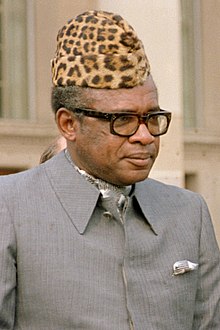Mobutu
| Mobutu Sese Seko | |
|---|---|

Mobutu at the Pentagon on 5 August 1983
|
|
| President of Zaire | |
|
In office 24 November 1965 – 16 May 1997 |
|
| Preceded by | Joseph Kasa-Vubu |
| Succeeded by | Laurent-Désiré Kabila |
| Personal details | |
| Born |
Joseph-Desiré Mobutu 14 October 1930 Lisala, Belgian Congo |
| Died | 7 September 1997 (aged 66) Rabat, Morocco |
| Nationality | Congolese |
| Political party | Popular Movement of the Revolution |
| Spouse(s) | Marie-Antoinette Mobutu (Deceased) Bobi Ladawa Mobutu |
| Children | 14 |
| Religion | Roman Catholic |
Mobutu Sese Seko Kuku Ngbendu Wa Za Banga (/məˈbuːtuː ˈsɛseɪ ˈsɛkoʊ/; 14 October 1930 – 7 September 1997), born Joseph-Désiré Mobutu, was the military dictator and President of the Democratic Republic of the Congo (which Mobutu renamed Zaire in 1971) from 1965 to 1997. He also served as Chairperson of the Organisation of African Unity in 1967–1968.
Once in power, Mobutu formed an authoritarian regime, amassed vast personal wealth, and attempted to purge the country of all colonial cultural influence, while enjoying considerable support from the United States due to its anti-communist stance.
During the Congo Crisis, Belgian forces helped Mobutu in a coup d'état against the nationalist government of Patrice Lumumba in 1960 to rule the government. Lumumba was the first leader in the country to be democratically elected, but he was subsequently deposed in a coup organised by Colonel Mobutu and executed by a Katangese firing squad led by Julien Gat, a Belgian mercenary. Mobutu then assumed the role of army chief of staff, before taking power directly in a second coup in 1965. As part of his program of "national authenticity", Mobutu changed the Congo's name to Zaire in 1971 and his own name to Mobutu Sese Seko in 1972.
...
Wikipedia
